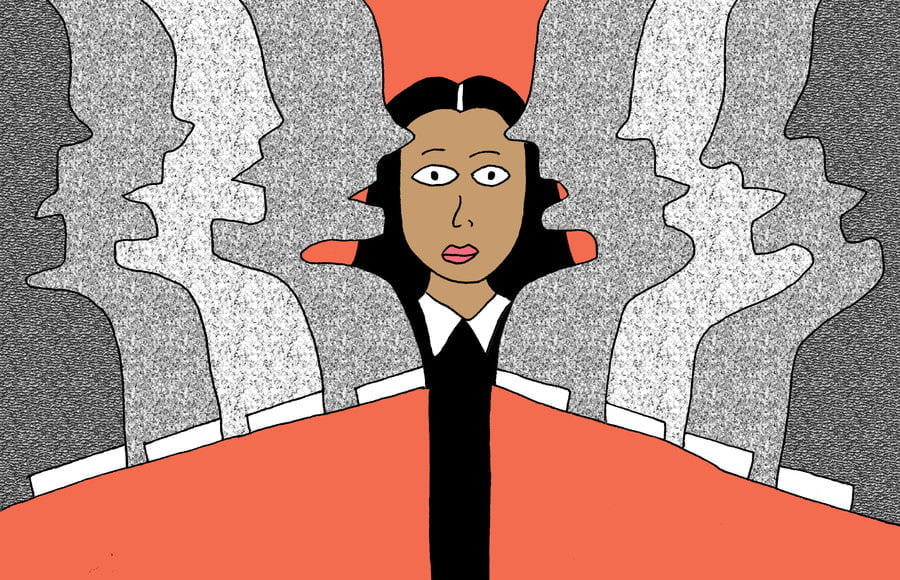The topic of women’s personal lives being discussed in a public or professional setting has long been haunting us in our sleep. It is very often seen in public settings that a group of professionals discuss their female colleague’s lifestyle choices or fashion decisions. There is an unhealthy scrutiny of women in the workplace, stemming from a sense of entitlement, where there are no compunctions in treating women’s lives as easily accessible.
Want to grab a coffee? Too bad, your colleagues are busy judging your pixie haircut behind your back.
Kalki Koechlin was asked, “Why are you against men? Has this anger increased after you got divorced?” It did not stop here, she was again asked, “Kalki, aren’t you ashamed of using words that are not acceptable in our society?” Koechlin answered with a “You mean words like ‘Fuck’?” She went on to point out that it is appropriate and an act of assertion when men curse, but if women do it, it is unacceptable. She also answered the first question saying, “Feminism is not about hating men, if that is what you think you need to spend more time reading about these concepts”.
The difference in questions asked to men and women is portrayed in this example, where Kangana Ranaut was asked by a reporter regarding the ‘shelf life’ of an actress. She displayed dismay upon reflecting on how ridiculous it is for reporters to focus on women’s careers depending on their looks, age and marital status, rather than what they have achieved and the potential of their talent.
This is not a pattern solely among celebrities and public figures; the average woman too faces this scrutiny of harassment and male entitlement. My apartment-mates are college-going women and I had asked them to share stories about the sort of scrutiny that they were subject to.
stemming from a sense of entitlement, there are no compunctions in treating women’s lives as easily accessible.
Shreya, 20 years old
When appearing for a college interview a few years ago, she discovered that the interviewer was more concerned with her appearance than her abilities and achievements. He was a senior professor in the college, who doubted her academic potential based on her eyebrow piercing and the skirt she had worn that day. “If you can dress like this so freely, you must be careless, irresponsible and rebellious, isn’t it? I suggest you reconsider your clothing choices if you want to be admitted to this college.”
Vasu, 21 years
She got caught sneaking beer into her college campus, where alcohol was banned. When she appeared for the hearing with the Disciplinary Committee (DISCO), the first question asked in the meeting was, “Why did you colour your hair?” For the next 30 minutes, three committee members asked her questions only about her coloured hair. After receiving a non-committal answer, the head of the committee proceeded to enlighten her about Indian culture and feminine beauty. Vasu was continuously harassed for answers and explanation, which had nothing to do with the only wrongful act that she was guilty of.
Karishma, 22 years
One day, three of her friends came over to her house to hang out. They had all just returned from college and were in the mood to take some funny selfies. In one of them, all three of them lifted their shirts up to fool around. The following week, a boy in their class leaked the photo. Instead of protecting the girls and looking for the culprit, the administration was bent on suspending them for defaming the college (because they were wearing their college uniforms in the photo). Throughout their time in the institutions, random students would walk up to her and ask what she was thinking and if she regretted it.
it is appropriate and an act of assertion when men curse, but if women do it, it is unacceptable.
Given that society is hostile to women who break the mould and rewrite their priorities on their own, conforming to the code becomes the easier and thus the more frequently opted choice. It is often vital for those who want to maintain a relationship with their own parents and family. Work culture in India adopts an attitude where they would rather fire young mothers rather than invest in arrangements like having day care facilities for their employees.
Would this be the same case for a man? No.
Such double standards are heavily employed in our society every single day. Women of my generation have clung to the feminist credo we were raised with, even as our ranks have been steadily thinned by unsolvable tensions between family and career, because we are determined not to drop the flag for the next generation.
Women are more than just their physical body, they have ideas, opinions and feelings. When people bring up a woman’s private life in public, they leave her vulnerable, exposed, and not knowing how to respond. In her mind, these incidents are the depiction of what a she amounts to in their eyes. Not as a person but a thing, a thing that is openly poked at and critiqued without permission. The kind of attitude that is instilled in a woman is that she is not a whole person who can freely be who she is just because of societal commentary. Women are taught to “not own” themselves and grow as mandated by generations of patriarchs.
Also Read: Male Privilege And Entitlement In India – A 101 Explainer Piece
Featured Image Credit: NPR
About the author(s)
Journalism student by day, insomniac (induced by the amount of knowledge in this world) by night.




